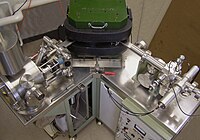
Tracking the heavy metal contaminants entrained with the flow into a Trickle bed hydrotreating Reactor packed with different catalyst shapes using newly developed noninvasive Dynamic radioactive particle Tracking
Sign Up to like & getrecommendations! Published in 2022 at "Chemical Engineering Journal"
DOI: 10.1016/j.cej.2021.132277
Abstract: Abstract A newly developed modified Dynamic Radioactive Particle Tracking system (DRPT) was used to investigate the heavy metal contaminants deposition locations in different catalyst beds, sphere, cylinder, trilobe, and quadrilobed in Trickle Bed Reactors. In… read more here.
Keywords: newly developed; metal contaminants; dynamic radioactive; metal ... See more keywords

Speciation and leaching of trace metal contaminants from e-waste contaminated soils.
Sign Up to like & getrecommendations! Published in 2017 at "Journal of hazardous materials"
DOI: 10.1016/j.jhazmat.2016.12.060
Abstract: Primitive electrical and electronic waste (e-waste) recycling activities have caused serious environmental problems. However, little is known about the speciation and leaching behaviors of metal contaminants at e-waste contaminated sites. This study investigated trace metal… read more here.
Keywords: trace; waste; speciation leaching; metal contaminants ... See more keywords

"Non-traditional" stable isotopes applied to the study of trace metal contaminants in anthropized marine environments.
Sign Up to like & getrecommendations! Published in 2022 at "Marine pollution bulletin"
DOI: 10.1016/j.marpolbul.2022.113398
Abstract: The advent of Multicollector ICP-MS advent inaugurated the analysis of new metal isotope systems, the so-called "non-traditional" isotopes. They are now available tools to study geochemical and ecotoxicological aspects of marine metal contamination and hence,… read more here.
Keywords: non traditional; isotopes applied; traditional stable; stable isotopes ... See more keywords

Impact of thermal processing on the nutrients, phytochemicals, and metal contaminants in edible algae.
Sign Up to like & getrecommendations! Published in 2020 at "Critical reviews in food science and nutrition"
DOI: 10.1080/10408398.2020.1821598
Abstract: Edible algae products have increasingly become a larger component of diets worldwide. Algae can be a source of essential micronutrients and bioactive phytochemicals, although select varieties also often contain elevated concentrations of heavy metal contaminants.… read more here.
Keywords: edible algae; processing; thermal processing; metal contaminants ... See more keywords

Wastewater-Irrigated Vegetables Are a Significant Source of Heavy Metal Contaminants: Toxicity and Health Risks
Sign Up to like & getrecommendations! Published in 2023 at "Molecules"
DOI: 10.3390/molecules28031371
Abstract: Water contaminated with heavy metals constitutes an important threat. This threat is a real problem with a negative impact in some developing countries where untreated industrial effluents are used for irrigation. The present study examines… read more here.
Keywords: health; wastewater irrigated; irrigated vegetables; risk ... See more keywords

Bivalve Shellfish Safety in Portugal: Variability of Faecal Levels, Metal Contaminants and Marine Biotoxins during the Last Decade (2011–2020)
Sign Up to like & getrecommendations! Published in 2023 at "Toxins"
DOI: 10.3390/toxins15020091
Abstract: Bivalves are a high-value product whose production has markedly increased, reaching 9863 tonnes in Portugal in 2021. Bivalves’ habitats—lagoons, estuaries and coastal waters—are exposed to biological and anthropogenic contaminants, which can bioaccumulate in these organisms… read more here.
Keywords: last decade; contaminants marine; marine biotoxins; 2011 2020 ... See more keywords